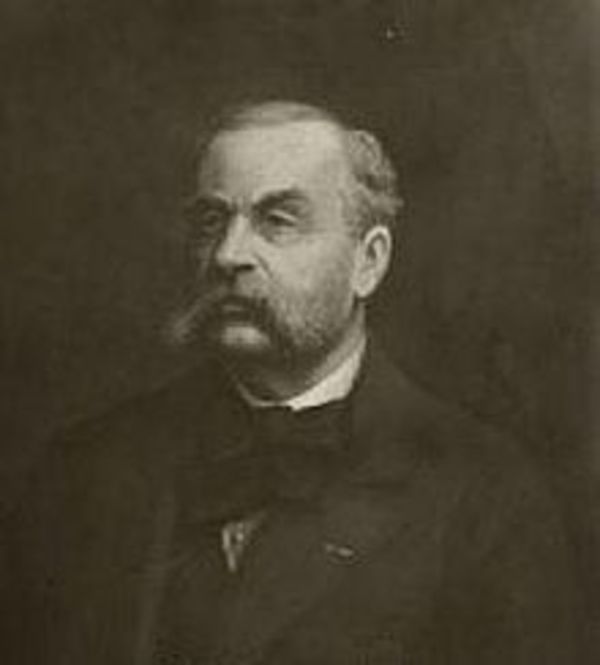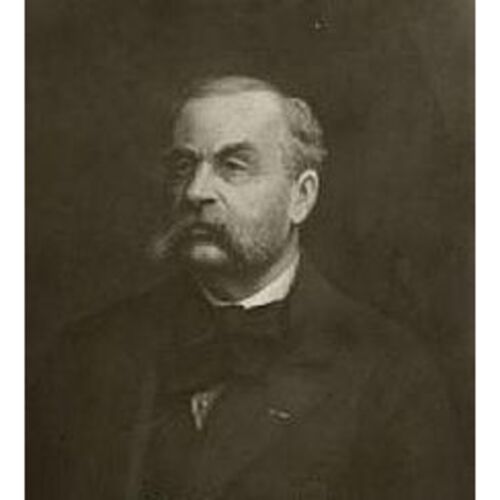
Source: Courtesy of Wikimedia Commons
PERRAULT, JOSEPH-XAVIER (also called Joseph-François), agronomist, educator, office holder, and politician; b. 27 May 1836 at Quebec, son of Joseph-François-Xavier Perrault, a lieutenant-colonel in the militia, and Marie-Esther Lussier; grandson of educator Joseph-François Perrault*; m. 16 Jan. 1866 Catherine-Flore Couillard in the parish of Notre-Dame in Montreal, and they had one daughter; d. 7 April 1905 in Montreal.
Joseph-Xavier Perrault did his classical studies at the Petit Séminaire de Québec from 1845 to 1854. He went on to do specialized work in agronomy at the University of Durham and then at the Royal Agricultural College in Cirencester, England, and the École de Grignon in France, both of which had a fine reputation in this field. On completing his education, Perrault became the first French Canadian agronomist with the university background and academic training that the designation implies.
When he returned from Europe in 1857 Perrault tried to set up two schools with farms, one at Varennes that year and the other at Sainte-Thérèse-de-Blainville (Sainte-Thérèse) on the outskirts of Montreal in 1858. His first attempt met with success in 1860, when the Société Provinciale Agronomique, created two years earlier, established an experimental farm in Varennes and appointed him principal and professor at the agricultural school attached to it. However, both farm and school closed the following year for want of students. In 1863 the Petit Séminaire de Sainte-Thérèse opened an agricultural school at Perrault’s prompting and hired a teacher from the École de Grignon. This new venture lasted only two years. Such institutions tended to be ephemeral and would remain so, owing mainly to the shortage of money and students. In 1864 Perrault chaired a special committee of the Legislative Assembly on agricultural instruction, which recommended that bursaries and prizes be given to students to encourage their enrolment in agricultural schools. It was suggested also that courses be offered in natural science, with an emphasis on agriculture. In the end only the bursaries were provided. Twenty years later, when Quebec had at least four agricultural schools, Perrault would write to the premier, John Jones Ross, to suggest that a chair in agriculture be created and be attached to the proposed École de Médecine Vétérinaire Française de Montréal [see Victor-Théodule Daubigny]. This plan came to nothing. In 1887, when the commission on agricultural education headed by Nazaire Bernatchez was sitting, he urged that university courses in agronomy be organized in Quebec.
Perrault pursued his agricultural concerns through his journalistic work. Upon his return from Europe he had been appointed secretary of the Bureau of Agriculture and the Board of Agriculture of Lower Canada (created in 1852), in succession to William Evans* who had recently died. What had been set up was in fact a government ministry, with a board, or administrative office, in each of the two parts of Canada. As its secretary, Perrault assumed responsibility in September 1857 for editing the Journal de l’agriculture et des travaux de la Chambre d’agriculture du Bas-Canada, which was also published in English under the direction of James Anderson. The journal had various names and adopted many approaches over the years, as was common with publications of this kind, because of lack of money, contributors, and readers.
Perrault held his position for 11 years. When he was accused of making a profit on wheat imported from the Black Sea, he decided to resign, thereby ending the most intense period of his involvement in agriculture. His opposition to confederation may also have worked against him. He had been elected for Richelieu to the Legislative Assembly of Canada in 1863, and the following year had joined the Club Saint-Jean-Baptiste, a secret society founded in Montreal by Ludger Labelle* to fight confederation. It was probably his membership in this society, which was frowned on by the bishops, that led to his defeat in the federal election of 1867 and damaged his image as a public figure and an influential member of the Bureau of Agriculture. In addition, he became involved in polemics with another influential farm newspaper, La Gazette des campagnes (Sainte-Anne-de-la-Pocatière), founded by Abbé François Pilote*, about Canadian cows and horses. The controversy complicated the situation for Perrault, who was in favour of importing purebred animals. In his opinion, such importation was the only way of improving the quality and value of Canadian stock.
In 1868 Perrault’s career took a new turn. Without completely abandoning agronomy and teaching, he concentrated more on improving the economic welfare of French Canadians. He had been a member of the Association Saint-Jean-Baptiste de Montréal since at least 1867, and took an energetic part in the society’s activities. He would become its vice-president in 1895 and president a few months before he died. In 1886 he persuaded a number of French Canadian businessmen to set up the Chambre de Commerce du District de Montréal, with the mandate of defending and promoting “the commercial and industrial interests of the city of Montreal and the province of Quebec.” Not long after the chamber was incorporated in 1887, Perrault became its vice-president, a position he retained until 1890. In 1888 Perrault and the chamber supported the plan for the Monument National in Montreal, to serve as an educational centre. In 1901 the chamber appointed a committee, of which Perrault was a member, to study the question of founding a school in the city for advanced studies in commerce.
An important part of Perrault’s career was devoted to assignments and service as an official representative abroad, on behalf of the chamber of commerce and the federal government. The latter appointed him secretary of the Canadian commission at the Philadelphia Centennial International Exhibition in 1876, and in 1878 he held a similar position in Paris. He was back in Paris for the 1889 universal exposition, this time as the delegate of the chamber of commerce. In 1892 and 1896 he attended congresses of chambers of commerce in London, England. He was also secretary-archivist of the Forestry Association of the Province of Quebec, founded in 1882, and secretary of the Société Générale de Colonisation et de Rapatriement, set up in 1893. France had recognized his achievements in the field of agriculture, naming him a chevalier of the Legion of Honour, then an officier de l’Instruction publique, an officier du Mérite agricole, and a foreign corresponding member of the Société Royale d’Agriculture de Paris in 1889.
A man of boundless energy, Perrault throughout his life kept the economic advancement of his compatriots uppermost in his mind. A Liberal in politics, he supported political independence for Canada and commercial union with the United States.
Joseph-Xavier Perrault is the author of the following pamphlets: Compte-rendu des travaux de la Chambre d’agriculture du Bas-Canada ([Montréal?, 1859?]); La carrière agricole; lecture donnée sous le patronage de l’Institut canadien-français (s.l., [1860?]); Exploration de Québec au lac St. Jean ([Montréal?, 1863?]); Discours prononcé . . . à l’Assemblée législative: la confédération de l’Amérique britannique du Nord (s.l., [1865?]; Quatre années en Parlement (s.l., [1867?]); Le lien colonial, c’est la banqueroute; la nation meurt de faim parce qu’elle est pieds et poings liés par le lien colonial (Montréal, 1878); Transatlantique franco-canadienne ([Montréal?, 1885?]).
AC, Montréal, État civil, Catholiques, Cimetière Notre-Dame-des-Neiges (Montréal), 10 avril 1905. ANQ-M, CE1-51, 16 janv. 1866. ANQ-Q, CE1-1, 28 mai 1836. Alain Duhamel, “Il y a 100 ans, J.-X. Perrault fondait la Chambre de commerce de Montréal,” Le Devoir, 14 oct. 1986. René Monette, “Les Perrault et l’avancement de l’agriculture québécoise,” Le Devoir, 22 juin 1946. P.-B. Casgrain, La vie de Joseph-François Perrault, surnommé le Père de l’éducation du peuple canadien (Québec, 1898). Firmin Létourneau, Histoire de l’agriculture (Canada français) (Montréal, 1959). M.-A. Perron, Un grand éducateur agricole: Édouard-A. Barnard, 1835–1898; étude historique sur l’agriculture de 1760 à 1900 ([Montréal], 1955). Robert Rumilly, Histoire de la Société Saint-Jean-Baptiste de Montréal: des patriotes au fleurdelisé, 1834–1948 (Montréal, 1975).
Cite This Article
François Hudon, “PERRAULT, JOSEPH-XAVIER (Joseph-François) (1836-1905),” in Dictionary of Canadian Biography, vol. 13, University of Toronto/Université Laval, 2003–, accessed April 28, 2025, https://www.biographi.ca/en/bio/perrault_joseph_xavier_13E.html.
The citation above shows the format for footnotes and endnotes according to the Chicago manual of style (16th edition). Information to be used in other citation formats:
| Permalink: | https://www.biographi.ca/en/bio/perrault_joseph_xavier_13E.html |
| Author of Article: | François Hudon |
| Title of Article: | PERRAULT, JOSEPH-XAVIER (Joseph-François) (1836-1905) |
| Publication Name: | Dictionary of Canadian Biography, vol. 13 |
| Publisher: | University of Toronto/Université Laval |
| Year of revision: | 1994 |
| Access Date: | April 28, 2025 |



